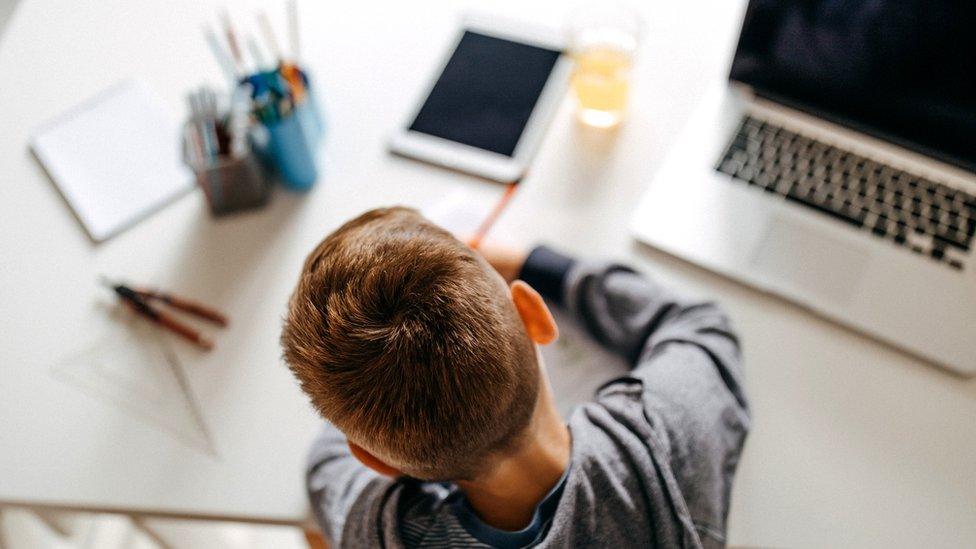Digital divide: What is it and how does it affect home learning?
- Published
- comments
We spoke to Freddie and Abdullah about their experiences
For lots of children, studying from home using things like laptops, tablet and phones has become a daily part of life.
However, some pupils in the UK don't have the same access to technology at home.
With schools across the UK closed again, many have raised concerns about what this means for those young people who can't learn so easily online.
At the start of the pandemic around 1.8 million children in the UK did not have access to a laptop, desktop or tablet at home, according to research by Ofcom - an organisation which regulates communication services in the UK including things like TV and radio, as well as mobile phone and internet services.
More than 880,000 children live in a household with only a mobile internet connection, meaning they might only be able to use the internet for a short while each day.
This means that some children are finding it harder to keep in touch with their teachers, classmates, family and friends. For many, it's also having a negative effect on their learning.
ENGLAND: Prime Minister Boris Johnson announced that schools in England will stay closed until at least 8 March.
SCOTLAND: Scotland's youngest pupils, P1 - P3, are likely to return to the classroom full time from 22 February as schools start a phased reopening.
WALES: First Minister Mark Drakeford has said that it is unlikely that all pupils will return to school full-time after February half-term.
NORTHERN IRELAND: Schools in Northern Ireland are closed until after the half-term break in mid-February.
What is the 'digital divide'?
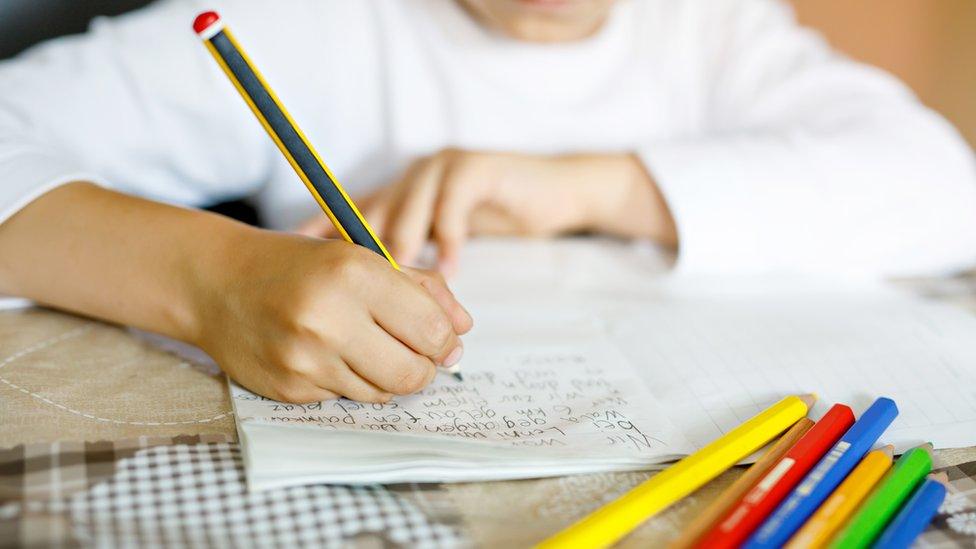
Some children have access to technology like phones, laptops and tablets, to help them do their schoolwork from home, but this isn't the same for other children, who have limited or no access to these devices.
This is called the digital divide.
The digital divide can happen for lots of different reasons, such as families not being able to afford new devices, or extra internet data, or because families have to share a device between them all.
There can also be a 'divide' when it comes to accessing reliable, cheap and quick internet in rural (countryside) areas compared to urban (towns and cities) places.
This can all mean that whilst some children can do their schoolwork on a digital device, other children are missing out on learning.
If you can't see this vote, try here.
Why are people worried about children not having access to devices or broadband?
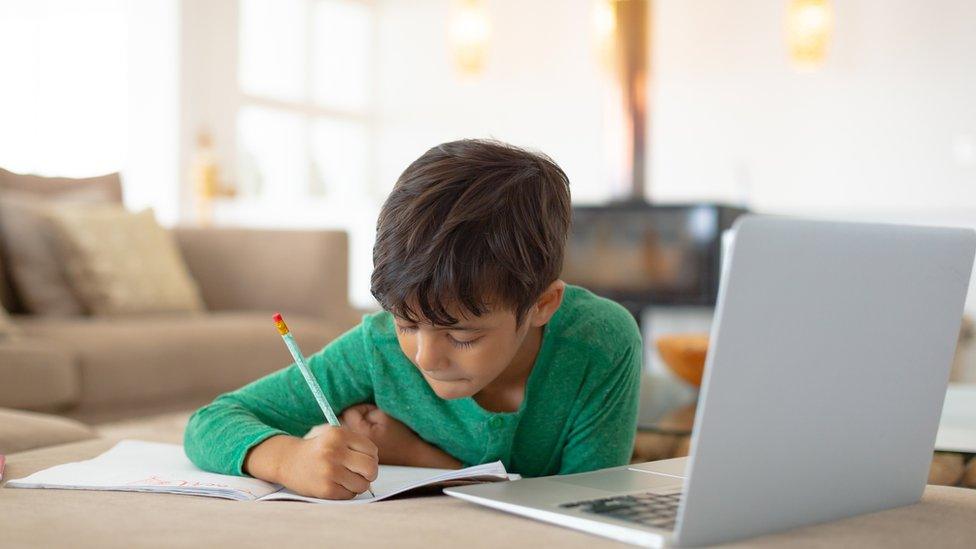
Anne Longfield is the Children's Commissioner for England - her role is all about speaking up for children's rights.
She has described the issue as "really urgent". She said: "If a child doesn't have access to broadband, and data, or devices they're not going to be able to learn, and that's just unacceptable."
Abdullah is in Year 7 at school and has spoken to Newsround about his experience - he is currently studying from home using his parent's phone which he says is "difficult and frustrating".
One of the challenges he faces is that "when the teacher is speaking, sometimes it lags and you can't really hear them, or it disconnects and you have to leave and rejoin".
He also said that because the screen is so small, he has difficulty typing replies to his teacher: "It takes like 10 minutes to just answer two questions."
But there is help and support for children and families who are trying to learn from home, but who don't have access to the digital equipment they need.
What is being done about the issue?

Gavin Williamson is the Secretary of State for Education, and is in charge of the Department of Education
The Department for Education, which looks after schools in England, has said that (as of 17 January 2021), the government had delivered 801,524 laptops to schools in England, and will donate 300,000 more devices.
It also runs a scheme called Get Help With Technology, where schools and local authorities can apply for internet data increases and devices for primary school children whose face-to-face education is disrupted, those children who are shielding, and college students whose education has been disrupted.
After his announcement that schools in England won't re-open until at least 8 March, Prime Minister Boris Johnson said the government would offer support for those who have fallen behind in their studies because of home learning, such as summer schools and money for tutoring schemes.
A spokesperson from the Department for Education said that "no child should fall behind as a result of coronavirus".
In Scotland, the government started a campaign last year called 'Connecting Scotland' to help get technology to children who need it, aiming to get 50,000 people online by the end of 2021.
The Welsh Government said it had supplied thousands of devices, and Education Minister Kirsty Williams pledged an extra £3 million in April last year for computers, so pupils could work from home.
Since the pandemic began, the Education Authority in Northern Ireland has loaned more than 11,000 digital devices to pupils.
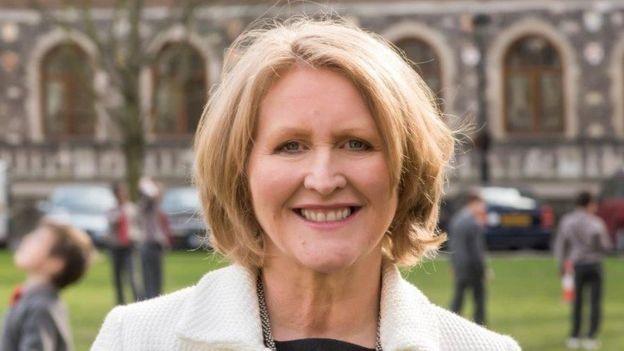
Children's Commissioner for England, Anne Longfield, wants the government to do more
However, some people have criticised leaders in the four nations for taking a long time to get devices to young people who need them, and for not giving out enough.
England's Children's Commissioner, Anne Longfield, said: "The Government have been sending out laptops, but I've been really frustrated by how slow that's been.
"There's still more laptops needed, there's still more help needed to get the cost of data down."
12% of schools who took part, had at least 20% of children without access to a digital device
More than half were sharing a device in 35% of schools or colleges
Bruce Adamson, Scotland's Children and Young People's Commissioner, said: "Many children and young people have had continued problems accessing online learning during periods of self-isolation, especially those with disabilities, and those from families on low incomes and families with one parent.
"The Scottish Government must ensure that every child that needs a device to access education, has one and can access meaningful support for education online."
What are internet companies doing to help?
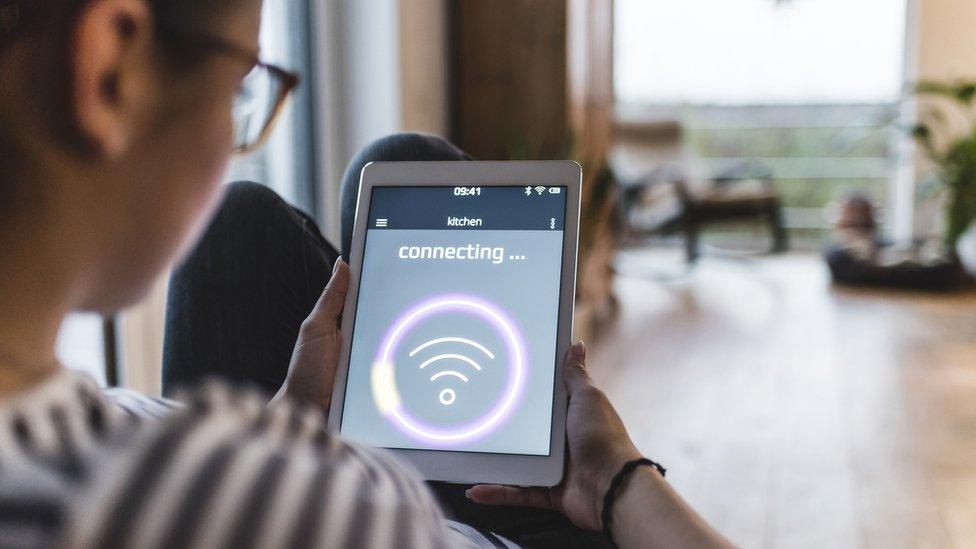
Some of the UK's internet and mobile phone companies have come together to offer discounts, and free access to learning facilities during the pandemic to help children.
So far EE, BT Mobile, Plusnet Mobile, Virgin Mobile, O2, Three and Vodafone have said online materials provided by the Oak National Academy educational website will be free to access until schools reopen.
BT, Plusnet and EE are also offering free access to BBC Bitesize resources. BT has asked the Scottish, Welsh and Northern Irish administrations to each suggest one extra online source for children in its areas.
As well as this, Vodafone is giving 350,000 free data sim cards to children who need them.
Normally there are strict rules - known as net neutrality - which mean that internet companies should treat all internet traffic equally, however Ofcom is expected to relax this given the situation.
What other support is there?
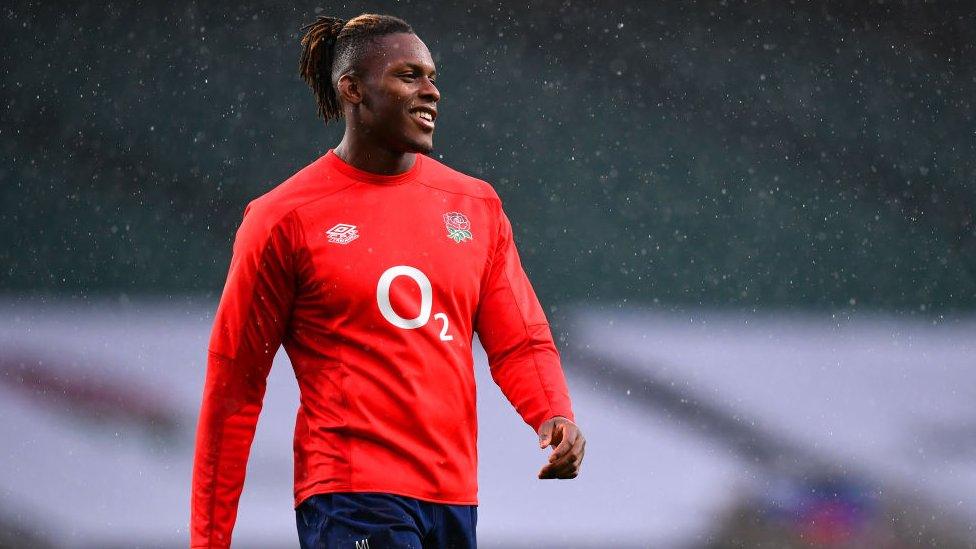
Maro Itoje plays rugby for England, and has spoken out about the digital divide and doesn't want kids to feel left behind
Some charities and local groups, like Donate IT, Saracens and The London Grip for Learning, have been donating and re-furbishing old laptops and devices to give to children who need them.
BBC local radio stations are also accepting donations of devices as part of their Make a Difference campaign, and working with organisations in the UK to get them to people who need them.
Celebrities such as professional Rugby player Maro Itoje, and young people have also been helping to raise awareness and take action.
Last March 17-year-old Sebbie, set out to raise £1000 by doing 100 acts of kindness, to help his friend who has learning difficulties and couldn't access the internet to do schoolwork.
Since then he has now raised almost £21,000 to help get specially adapted laptops and tablets to young people with disabilities in the UK.
What can you do if you're struggling to learn online?
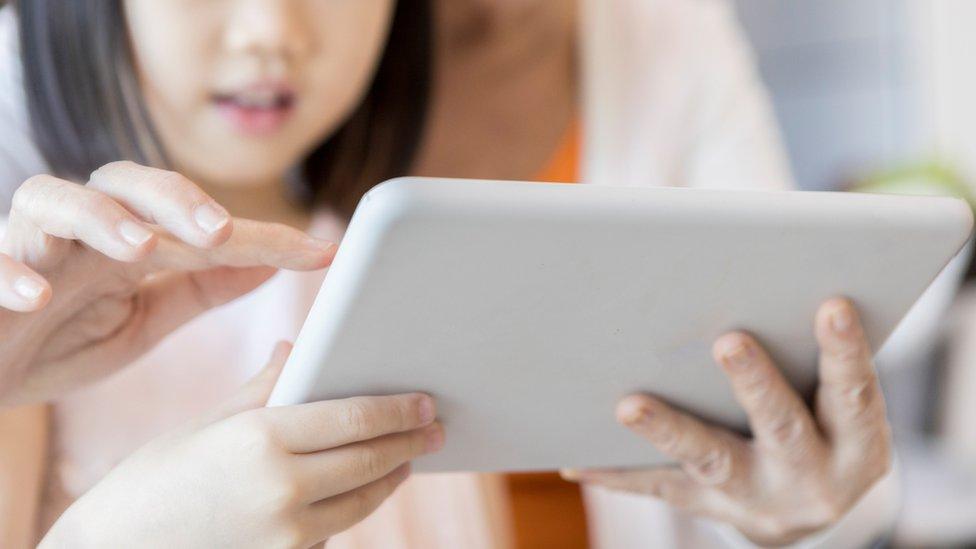
Speak to an adult you trust: It's always useful to share how you feel with an adult you trust - that might be a parent, grandparent or teacher. They might also be able to look into what support is available or be able to reassure you about any help you and your family might be getting already.
Speak to your teacher: The Children's Commissioner for England, Anne Longfield, said that one of the best things to do if you are struggling with studying from home, is to speak to your teacher.
Teachers can apply to government schemes to try to get devices for you, or can chat to you to see what changes they could make to help make learning better for you at home, such as providing print-outs.
Schools are still open to some children, including those whose parents are key workers or vulnerable young people. In Wales and England guidance for schools includes pupils who "may have difficulty engaging with remote education at home (for example due to a lack of devices or quiet space to study)".
Learn offline: There are other ways to learn, for example lessons broadcast on TV. BBC Bitesize is offering three hours of free primary school lessons every weekday on CBBC and at least two hours for secondary school pupils on BBC Two.
Access data-free lessons online: As well as the BBC Bitesize website, Oak National Academy is an educational website which is offering free lessons to children up to Year 11 during lockdown, and will not use up internet data on the following networks: EE, BT Mobile, Plusnet Mobile, Virgin Mobile, O2, Three and Vodafone.
Consoles can also work: If you are sharing a device but have a PlayStation or an Xbox in your house you can use the internet feature to access sites like Bitesize or Oak National Academy.
On an Xbox console, press the Xbox button on the controller to open the guide, then select "My games & apps". Next you'll need to find Microsoft's internet browser Microsoft Edge.
For a PS4, go from the home screen to the library, then click on applications. If you scroll down the apps you'll see a "www" sign circled by small dots, click it to access the internet.
Find out more advice here.
If you are feeling worried, there is lots of support out there for you to get help.
Speak to an adult you trust, like a parent, guardian or a teacher.
You can also contact Childline on 0800 1111 for free at any time.
Childline is run by the NSPCC.
- Published10 February 2021
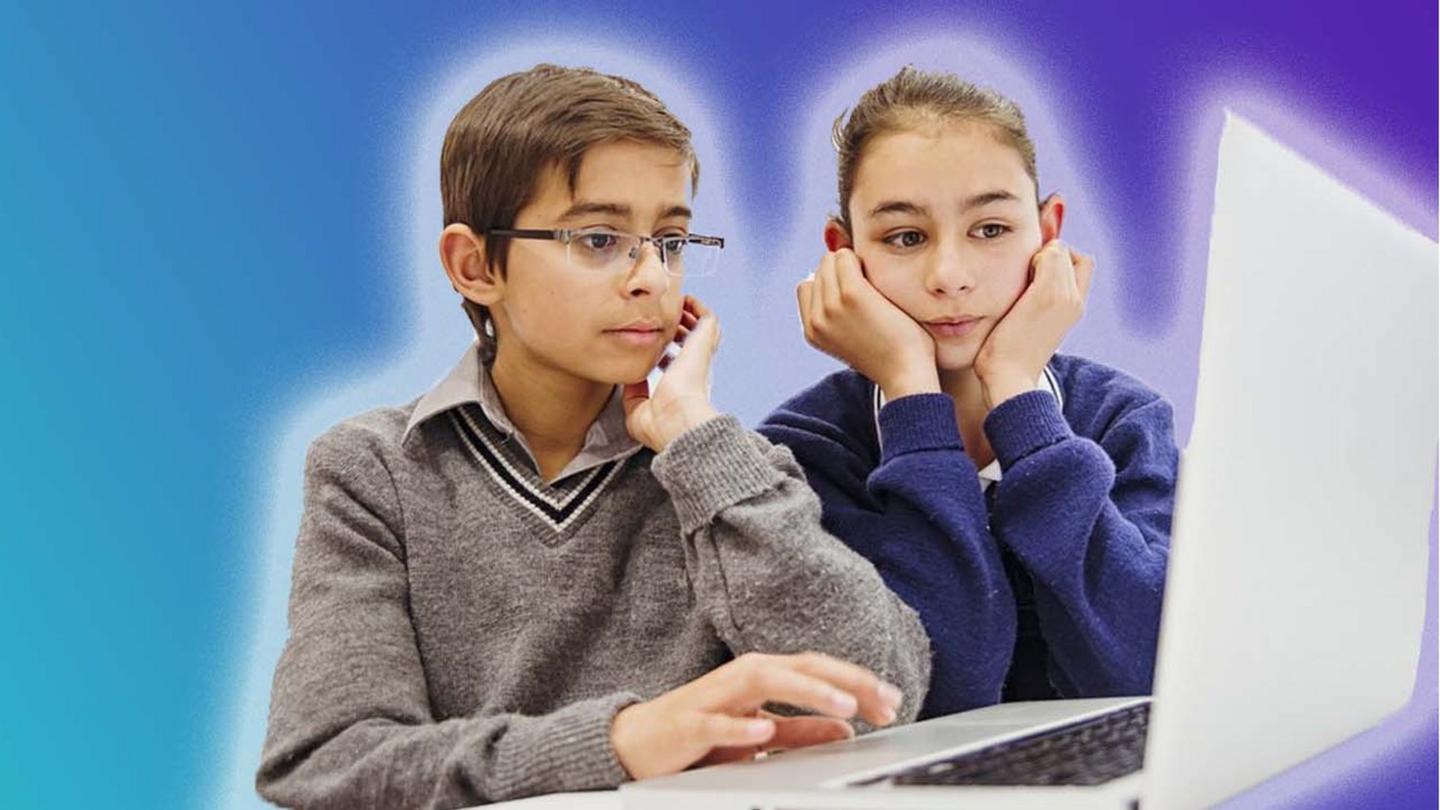
- Published15 June 2020

- Published27 August 2020

- Published13 July 2020
